| dc.contributor.author | Sklett, Vegard Haukø | |
| dc.contributor.author | Lorås, Håvard | |
| dc.contributor.author | Sigmundsson, Hermundur | |
| dc.date.accessioned | 2018-08-27T13:13:49Z | |
| dc.date.available | 2018-08-27T13:13:49Z | |
| dc.date.created | 2018-08-22T08:53:05Z | |
| dc.date.issued | 2018 | |
| dc.identifier.issn | 1664-1078 | |
| dc.identifier.uri | http://hdl.handle.net/11250/2559455 | |
| dc.description.abstract | The present study investigated the relationship between self-efficacy, flow, positive- and negative affect, worry and ski jumping performance, as well as the degree of influence these psychological factors have on ski jumping performance in specific competitions and overall World Cup ranking. World Cup ski jumpers (N = 40) responded to four questionnaires in the middle of the World Cup season, reporting their subjective experience during a competitive setting over a period of three consecutive days. Social Cognitive Theory (SCT) and Flow Theory was used as main conceptual frameworks. Self-efficacy was moderately related to ski jumping performance, both overall World Cup ranking (r = −0.37) and the results from the first out of three individual ski flying competitions (r = −0.36) and explained approximately 14% of the variance in the overall World Cup. Flow was moderately related to ski jumping performance, both overall World Cup ranking (Flow-Focus) (r = −0.34), and individual ski flying results from the first competition (Flow-Arousal) (r = −0.36). The Flow-Arousal explained approximately 13% of the variance in ski flying results. Worry was highly related to ski jumping performance in the second (r = 0.60) and third (r = 0.52) competition, indicating that approximately 36 and 27% of the variance in ski flying results could be accounted for by levels of worry, respectively. Negative affect was moderately related to ski flying performance (r = 0.34). These results show that psychological factors that regulate emotional states may be of importance for World Cup ski jumping performance, and that appropriate coping strategies, constructive mindset and motivation, appears to be essential in this regard. To our knowledge, this is the first study on the relationship between these psychological factors and ski jumping performance among World Cup athletes. The study adds important information about some of the dynamic features of emotional and psychological mechanisms involved during elite ski jumping performance. | nb_NO |
| dc.language.iso | eng | nb_NO |
| dc.publisher | Frontiers Media | nb_NO |
| dc.rights | Navngivelse 4.0 Internasjonal | * |
| dc.rights.uri | http://creativecommons.org/licenses/by/4.0/deed.no | * |
| dc.title | Self-Efficacy, Flow, Affect, Worry and Performance in Elite World Cup Ski Jumping | nb_NO |
| dc.type | Journal article | nb_NO |
| dc.type | Peer reviewed | nb_NO |
| dc.description.version | publishedVersion | nb_NO |
| dc.source.journal | Frontiers in Psychology | nb_NO |
| dc.identifier.doi | https://doi.org/10.3389/fpsyg.2018.01215 | |
| dc.identifier.cristin | 1603661 | |
| dc.description.localcode | Copyright © 2018 Sklett, Lorås and Sigmundsson. This is an open-access article distributed under the terms of the Creative Commons Attribution License (CC BY). | nb_NO |
| cristin.unitcode | 194,67,40,0 | |
| cristin.unitcode | 194,65,30,0 | |
| cristin.unitname | Institutt for psykologi | |
| cristin.unitname | Institutt for nevromedisin og bevegelsesvitenskap | |
| cristin.ispublished | true | |
| cristin.fulltext | original | |
| cristin.qualitycode | 2 | |

